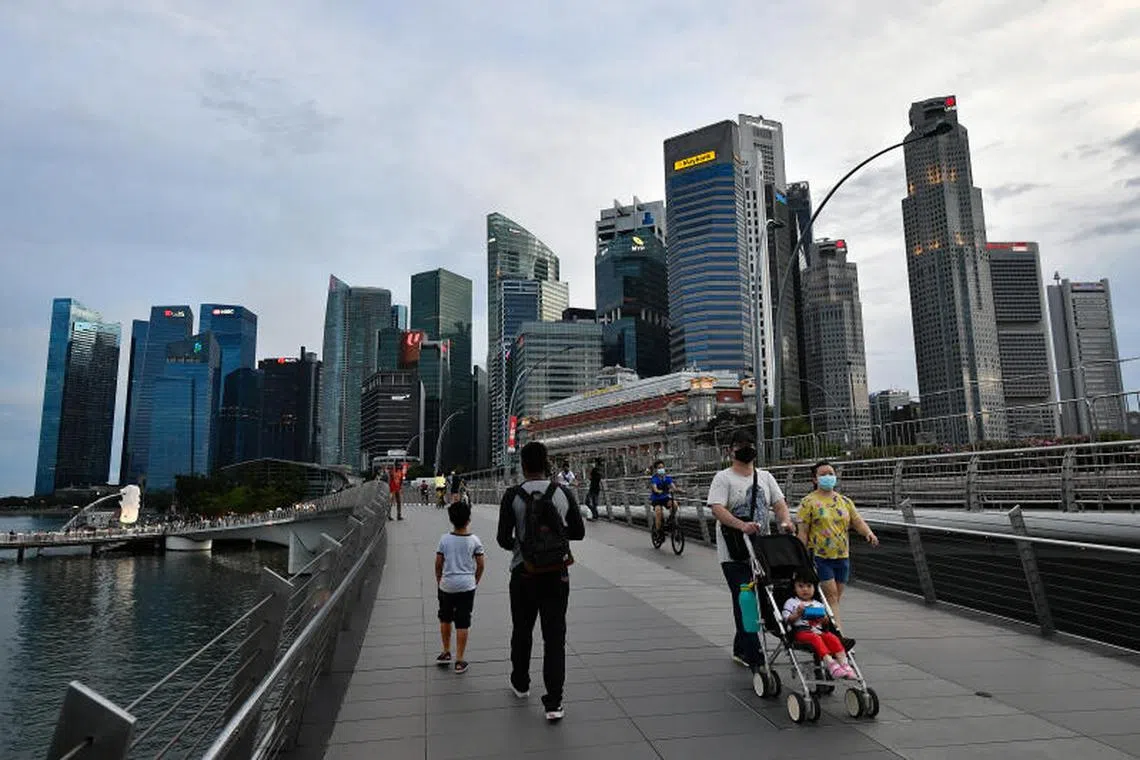Singapore sees economic growth slowing to 0.5-2.5% in 2023 from 3.5% this year
Sign up now: Get ST's newsletters delivered to your inbox

The Singapore economy is expected to grow by 0.5 per cent to 2.5 per cent in 2023, MTI said in its first forecast for the new year.
PHOTO: ST FILE
SINGAPORE - Economic growth in Singapore will ease next year as weakening global demand will weigh down export-driven sectors, the Ministry of Trade and Industry (MTI) said on Wednesday.
The Singapore economy is expected to grow by 0.5 per cent to 2.5 per cent in 2023, MTI said in its first forecast for the new year.
The ministry also narrowed its gross domestic product (GDP) growth projection for this year, saying Singapore may achieve GDP growth of “around 3.5 per cent”, compared with an earlier forecast of 3 per cent to 4 per cent.
The prediction is a notable decline from the 7.6 per cent growth achieved in 2021.
However, it is unsurprising as most analysts had already lowered their projections amid recession fears in Europe and the United States and prospects of continued sluggish growth in China – all major trading partners of Singapore.
“The growth of outward-oriented sectors in Singapore is expected to weaken in tandem with the deterioration in external demand conditions,” MTI said.
In line with the weakening outlook for global demand, Enterprise Singapore separately said that both total merchandise trade and non-oil domestic exports (Nodx) will shrink by 2 per cent or, at best, see no growth next year. For 2022, Nodx is forecast to grow by around 6 per cent.
MTI pointed to the weaker outlook for the euro zone economy amid an energy crunch due to the Russia-Ukraine war. China continues to grapple with recurring Covid-19 outbreaks
In the US, MTI said, GDP growth is projected to slow significantly as elevated inflation and rising interest rates weigh down private consumption.
Meanwhile, core inflation saw some respite, easing to 5.1 per cent in October from 5.3 per cent in the previous month, in the first dip since February this year. Overall inflation came in at 6.7 per cent, lower than September’s 7.5 per cent.
Mr Gabriel Lim, Permanent Secretary for Trade and Industry, said there are still significant uncertainties and downside risks in the global economy. “With many advanced economies raising interest rates simultaneously to combat high inflation, the impact of tightening financial conditions on global growth could be larger than expected.”
He added that further escalations in the war in Ukraine and geopolitical tensions between major global powers could also worsen supply disruptions, dampen consumer and business confidence, and further weigh on global trade.
However, aided by the lifting of travel curbs, the outlook for Singapore’s aviation- and tourism-related sectors such as air transport, accommodation and arts, entertainment and recreation remains positive, MTI said. But the performance of the domestic services industry will likely be overshadowed by the weakening outlook for export-oriented sectors.
For instance, the semiconductors segment of the electronics cluster is expected to be negatively affected by the fall in global demand for semiconductors.
Meanwhile, the machinery and systems segment of the precision engineering cluster is projected to be weighed down by a cutback in capital spending by semiconductor manufacturers amid weak demand.
At the same time, growth in the wholesale trade, water transport, finance and insurance sectors is expected to be dampened by the slowdown in major external economies.
Replying to a question on the impact of slower growth on the labour market, Mr Kenny Tan, divisional director of the manpower planning and policy division at the Ministry of Manpower, said: “We do expect some moderation, especially across some of the sectors that will be more affected.”
But he added that the job market is still quite strong, with a lot of vacancies unfilled and non-resident employment growing.
Mr Lim said the Government has been very clear and consistent with its commitment to make sure that jobs are protected and Singaporeans are taken care of.
“We are on the lookout in case the market softens, and we are on standby in case we need to do something to support Singapore workers should the economy soften further.”
The move to lower the full-year 2022 forecast came after the economy expanded in the third quarter by 4.1 per cent on a year-on-year basis, less than the 4.5 per cent growth in the previous quarter.
On a quarter-on-quarter seasonally adjusted basis, the economy grew by 1.1 per cent, reversing the 0.1 per cent contraction in the second quarter.
The manufacturing sector expanded at a slower pace of 0.8 per cent year on year, compared with the 5.6 per cent growth in the preceding quarter. The information and communications sector expanded by 6.2 per cent, moderating from the 9.8 per cent growth in the previous quarter.
Still, the construction sector grew by 7.8 per cent, accelerating from the 4.8 per cent growth in the previous quarter, as both public- and private-sector construction output rose.
The wholesale trade sector expanded by 5.4 per cent year on year, faster than the 1.6 per cent growth in the preceding quarter.
However, MTI said that for the rest of the year, the weaker external economic outlook will weigh on the growth of outward-oriented sectors, including the electronics and chemicals clusters.
In contrast, the strong recovery in air travel and international visitor arrivals is expected to continue to benefit aviation- and tourism-related sectors such as air transport and arts, entertainment and recreation, as well as consumer-facing sectors like food and beverage services.
The lifting of travel restrictions in Singapore and the region has also boosted the recovery of the professional services sector.
Most analysts have already lowered their predictions for GDP growth to below 3 per cent after the Monetary Authority of Singapore (MAS) said in October that the pace of growth may come below the historical trend.
DBS Bank recently revised its 2023 GDP growth forecast for Singapore to 2.2 per cent, down from 3 per cent previously. Morgan Stanley expects growth to slow to 2.3 per cent.
Mr Edward Lee, Standard Chartered Bank’s chief economist for Asean and South Asia, said MAS’ view that the economy will grow at a below-trend pace implies growth in the vicinity of 2 per cent to 2.5 per cent.



